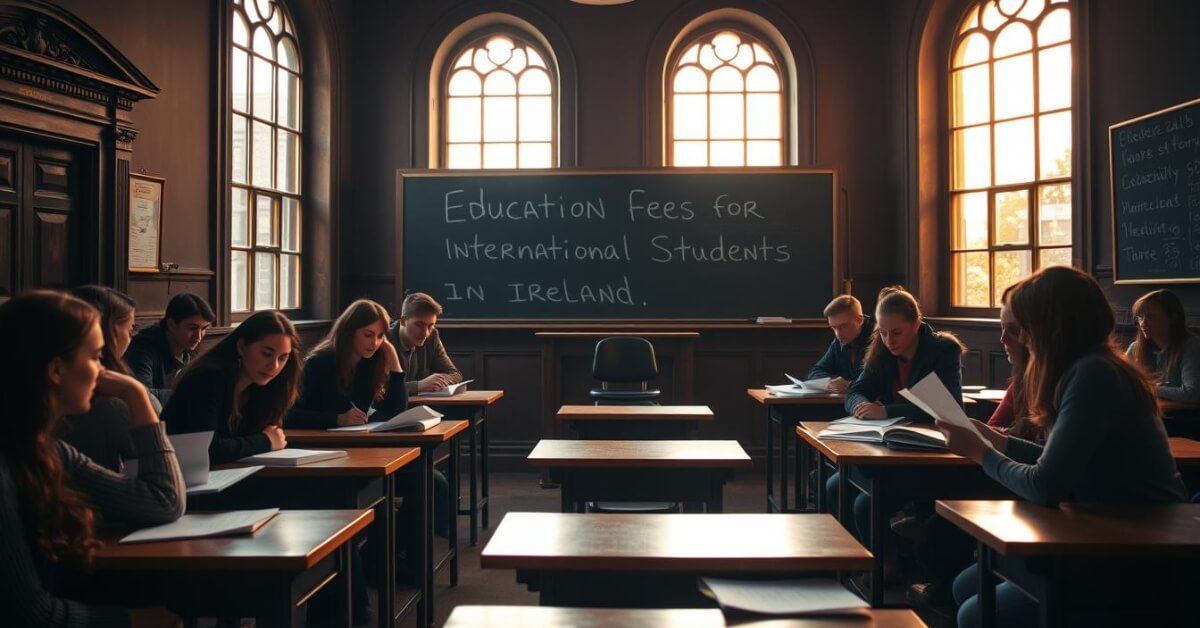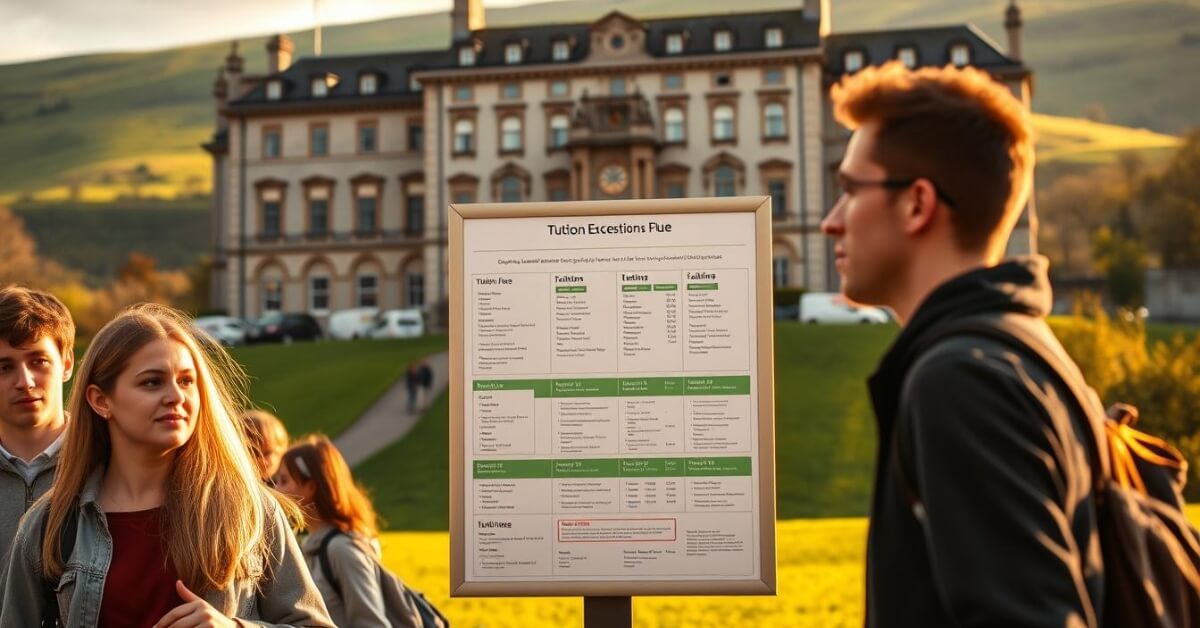Ever thought about if education is free in Ireland for international students? It’s important to know the costs of higher education in Ireland if you’re thinking of studying there. While primary and secondary education is free for locals, it’s a different story for international students.
Higher education in Ireland comes with a price tag, and it’s not the same for everyone. Let’s dive into the details of tuition fees and other expenses. This will help us understand the truth about paying for education in this beautiful country.
Understanding the Irish Education System
The education system in Ireland has three main levels: primary, secondary, and higher education. All kids between 6 and 16 get free education. This means refugees and migrant families’ children can also get quality schooling in Ireland.
Primary education lasts eight years, then three to six years of secondary. After secondary school, students can go to higher education. Irish universities offer many courses in English.
While most classes are in English, some programs use Irish. This variety makes education rich and accessible for everyone. It helps both local and international students learn a lot.
Is Education Free in Ireland for International Students
In Ireland, many wonder if education is free for international students. The cost of education in Ireland changes based on where you’re from. It’s key to know these differences if you’re thinking about studying here.
Overview of Tuition Fees for International Students
Tuition fees for international students can change a lot. They can range from €5,500 to €55,000. Universities set their fees based on the level of study, like undergraduate or postgraduate. It’s important to check the exact cost for your program.
Comparison: EU vs. Non-EU Tuition Rates
When thinking about studying in Ireland, remember the big difference in tuition fees. EU students usually pay less because of government support. Non-EU students, on the other hand, face higher fees. This makes studying in Ireland more affordable for EU students.

Tuition Fees in Ireland
Understanding tuition fees in Ireland is key for international students. The cost of education can vary a lot. This depends on the program and the school. For example, Trinity College Dublin and University College Dublin have different fees for both undergrad and postgraduate studies.
Typical Costs for Undergraduate and Postgraduate Programs
Undergraduate fees in Ireland usually range from €9,000 to €45,000 a year. This depends on the subject and the university. Postgrad programs cost more, from €10,000 to €30,000.
Arts and humanities tend to be cheaper. But, business and tech courses are pricier.
Costs for Specialized Courses like Medicine and Dentistry
Specialized courses, like Medicine and Dentistry, are very expensive. They can cost over €50,000 a year. This is because they require a lot of clinical training.
There’s also a high demand for doctors and dentists. Students need to be ready for these costs when planning their education in Ireland.

Free Fees Initiative for EU Students
The Free Fees Initiative is a big help for EU students in Ireland. It makes going to college cheaper by cutting down on costs. This lets students focus on learning without worrying about money.
Eligibility Criteria for the Free Fees Initiative
To get free fees, students need to meet some rules. They must be:
- EU residents for at least three years.
- Starting their first undergraduate course.
- Studying full-time for at least two years.
Knowing these rules is key for students wanting to save money on college. If they meet these criteria, they can get a great deal on education in Ireland.
What Does the Initiative Cover?
The initiative mainly helps with tuition fees for EU students at public schools. It makes college cheaper, but it doesn’t cover everything. For example:
- It doesn’t pay for living costs like housing and food.
- It doesn’t cover books and course materials.
- It also doesn’t include fees for student services and activities.
Even though the free fees initiative is a great chance, it’s important to know what it includes. This helps with budgeting.
| Covered by Initiative | Not Covered |
| Tuition fees for eligible EU students | Accommodation costs |
| Tuition fees for full-time undergraduate programs | Books and supplies |
| No fees for first undergraduate course | Student services and activity fees |
Knowing these details helps students manage their money better. They can enjoy the benefits of the free fees initiative without surprises.
Additional Education Expenses in Ireland
Tuition fees are a big part of education costs in Ireland. But, students also face other living costs. These include accommodation, food, transportation, and healthcare. The cost can change a lot based on where you live and your lifestyle.
Living Costs and Other Financial Considerations
It’s key to understand living costs for students. They usually spend €800 to €1,200 a month. This amount depends on where they live. Here’s a list of typical monthly expenses:
| Expense Category | Average Cost (€/month) |
| Accommodation | €400 – €800 |
| Food | €200 – €300 |
| Transportation | €100 – €150 |
| Healthcare | €50 – €100 |
| Miscellaneous | €100 – €200 |
Student Contribution Fees and Other Potential Fees
Students also have to think about student contribution fees. These fees can be up to €3,000 a year. But, they can change based on the school. It’s important to check the fees for your school to plan your money well.
Scholarships and Financial Aid Options
Getting funding for school in Ireland can really help with costs. There are many scholarships and financial aid options for students. Universities in Ireland offer scholarships for international students. These can cover all or part of tuition fees, based on certain rules.
It’s key to know about scholarships and how to get financial aid in Ireland. This is important for students planning to study there.
Types of Scholarships Available for International Students
International students have many scholarship choices at Irish universities. Here are some common ones:
- Merit-based scholarships: These are for students with high grades. They help pay for a lot of tuition.
- Need-based scholarships: These help students who don’t have much money. They’re for those who really need it.
- Country-specific scholarships: Some schools offer these for students from certain countries. They help bring more diversity and teamwork.
How to Apply for Financial Aid and Scholarships
Applying for scholarships and financial aid in Ireland has a few steps:
- First, look for options. Check university websites or talk to the international student office for the latest info.
- Next, get ready your documents. You’ll need your school records, letters of recommendation, and a personal statement. This should explain your financial situation and why you want to study.
- Then, send in your application. Make sure you meet the deadlines and have everything ready.
Knowing these steps can make applying for scholarships easier. It can help you have a great time studying in Ireland. Also, look into Irish student loans. They might help with your financial needs too.
Conclusion
Studying in Ireland offers great chances and financial challenges for international students. While some dream of free education, the truth is that tuition fees apply, mainly for non-EU students. It’s key for future students to understand these costs.
Students need to think about more than just tuition fees. Living expenses can change a lot, depending on where you live and how you choose to live. It’s important for those studying abroad to look into all costs and find financial help, like scholarships for international students.
Even though free education isn’t available to all, there are ways to make things easier. With good planning, international students in Ireland can find a balance between their studies and money matters.
Frequently Asked Questions
Is primary and secondary education free for residents in Ireland?
Yes, primary and secondary education in Ireland is free for everyone, including refugees and migrant families. It covers kids from 6 to 16 years old.
Are there tuition fees for international students in Ireland?
Yes, while primary and secondary education is free, international students must pay for higher education. Tuition fees can range from €5,500 to €55,000, depending on the program.
How do EU and Non-EU tuition rates compare in Ireland?
EU students often get lower tuition fees thanks to government support. Non-EU students usually pay more, showing a big difference between the two groups.
What are the typical costs for undergraduate programs in Ireland?
Tuition fees for undergraduate programs vary by university. But, EU residents usually pay less than Non-EU students.
Are there additional fees for specialized courses like Medicine and Dentistry?
Yes, Medicine and Dentistry courses have higher tuition fees. This reflects the big financial investment needed for these programs.
What is the student contribution fee?
The student contribution fee in Ireland can be up to €3,000, depending on the institution. It’s an extra cost students need to plan for, on top of tuition fees.
What scholarships are available for international students in Ireland?
Many universities offer scholarships for international students. These can cover full or partial tuition fees, helping to lower educational costs a lot.

